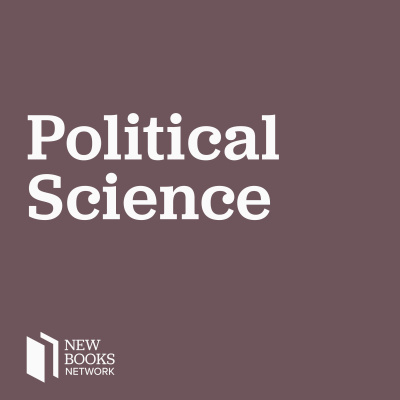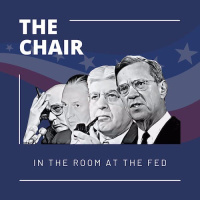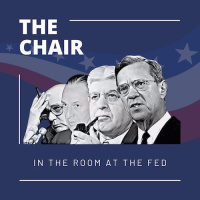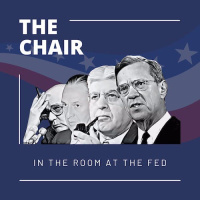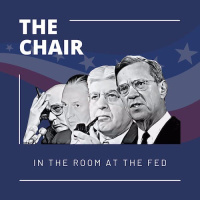Synopsis
Interviews with Political Scientists about their New Books
Episodes
-
Democracy Promotion, Progressive Realism and the Labour Government’s Policy Towards Asia
16/08/2024 Duration: 39minDoes the Labour Party’s 2024 election victory spell the end of the United Kingdom’s foreign policy interest in Asia? And how will its ‘progressive realism’ foreign policy paradigm shape its democracy promotion efforts in this region? Listen to Ben Bland as he talks to Petra Alderman about the UK’s post-Brexit tilt towards Asia, the new Labour government’s foreign policy priorities, and the tensions the ‘progressive realism’ paradigm might pose to the UK government’s democracy promotion activities in Asia. While Ben and Petra discuss these issues from a regional perspective, they focus more closely on what this means for the UK’s relations with Southeast Asia and the Association of Southeast Asian Nations (ASEAN). Ben Bland is the director of the Asia-Pacific programme at Chatham House. His research focuses on the nexus of politics, economics and international relations in Southeast Asia, as well as China’s growing role in the broader region and the contours of US-China strategic competition. Petra Alderman is
-
Heath Brown, "Roadblocked: Joe Biden's Rocky Transition to the Presidency" (UP of Kansas, 2024)
16/08/2024 Duration: 59minPolitical Scientist Heath Brown’s new book, Roadblocked: Joe Biden's Rocky Transition to the Presidency (UP of Kansas, 2024), examines the presidential transition between the Trump Administration and the Biden Administration in late 2020 and into 2021. Presidential transitions are not all that frequent, since presidents who are re-elected do not need to go through a transition to their second term. Thus, while there have been over forty presidents, there have been far fewer transitions. And until January 6, 2021, the history of transitions has been marked by the peaceful change of power between presidents and parties. While Brown is not focusing on January 6, 2021, he is analyzing the unique transition between Donald J. Trump and Joe Biden, and their respective administrations, and how that particular transition did not necessarily reflect the institutional norms of previous presidential transitions. Roadblocked tells two stories about the roadblocks. There were the external roadblocks, which came from the va
-
Claudio Lomnitz, "Sovereignty and Extortion: A New State Form in Mexico" (Duke UP, 2024)
15/08/2024 Duration: 01h53minOver the past fifteen years in Mexico, more than 450,000 people have been murdered and 110,000 more have been disappeared. In Sovereignty and Extortion: A New State Form in Mexico (Duke UP, 2024), Claudio Lomnitz examines the Mexican state in relation to this extreme violence, uncovering a reality that challenges the familiar narratives of “a war on drugs” or a “failed state.” Tracing how neoliberal reforms, free trade agreements, and a burgeoning drug economy have shaped Mexico’s sociopolitical landscape, Lomnitz shows that the current crisis does not represent a tear in the social fabric. Rather, it reveals a fundamental shift in the relationship between the state and the economy in which traditional systems of policing, governance, and the rule of law have eroded. Lomnitz finds that power is now concentrated in the presidency and enforced through militarization, which has left the state estranged from itself and incapable of administering justice or regaining control over violence. Through this critical ex
-
James Madison and the Spirit of Self-Government: A Conversation with Colleen Sheehan
14/08/2024 Duration: 55minWho was James Madison? Why were his Notes on Government so valuable to the American founding? Did James Madison, Alexander Hamilton, and George Washington all achieve what Sheehan calls “Civic Friendship”? Colleen Sheehan joins Madison’s Notes to discuss her seminal works on James Madison: The Mind of James Madison: The Legacy of Classical Republicanism (Cambridge University Press, 2025) and James Madison and the Spirit of Republican Self-Government (Cambridge University Press, 2019). Colleen Sheehan is a former Republican member of the Pennsylvania House of Representatives. A former, longtime member of the Villanova University faculty, she is currently a professor of politics and ethics in the Arizona State University's School of Civic and Economic Thought and Leadership Madison’s Notes is the podcast of Princeton University’s James Madison Program in American Ideals and Institutions Learn more about your ad choices. Visit megaphone.fm/adchoices Support our show by becoming a premium member! https://newbooks
-
Peter Charles Hoffer, "The Supreme Court Footnote: A Surprising History" (NYU Press, 2024)
12/08/2024 Duration: 01h04minWhen the draft majority decision in Dobbs v. Jackson Women's Health was leaked, the media, public officials, and scholars focused on the overturning of Roe v. Wade. They noted Justice Alito’s strident tone and radical use of originalism to eliminate constitutional protection for reproductive rights. My guest today has written a book that asks us to also notice over 140 footnotes in the majority opinion and dissent. Are these notes part of the law? In his new book, The Supreme Court Footnote: A Surprising History (NYU Press, 2024), Dr. Peter Charles Hoffer insists that these notes are significant. The footnotes reveal the justices' beliefs about the Constitution's essence, highlight their controversial reasoning, and expose “vastly different interpretations of the role of Supreme Court Justice.” Using a comprehensive qualitative analysis, The Supreme Court Footnote, offers a history of the evolution of footnotes in US Supreme Court opinions and a thoughtful set of case studies to reveal the particular ways tha
-
Spencer Piston, “Class Attitudes in American Politics: Sympathy for the Poor, Resentment of the Rich, and Political Implications” (Cambridge UP, 2018)
11/08/2024 Duration: 33minIt has long been a truism that Americans’ disdain for poor people–our collective sense that if they only worked harder or behaved more responsibly they would do well in this land of opportunity–explains, at least in part, why it is we have such a weak and limited public welfare state. But what if that very premise is false? What if, to the contrary, a majority of Americans have sympathy for poor people and disdain for the wealthy? And what if those feelings have demonstrable policy effects? Join us as we speak with Spencer Piston about a provocative new book Class Attitudes in American Politics: Sympathy for the Poor, Resentment of the Rich, and Political Implications (Cambridge University Press, 2018), a work that unsettles some long-held assumptions about American class attitudes. Learn more about your ad choices. Visit megaphone.fm/adchoices Support our show by becoming a premium member! https://newbooksnetwork.supportingcast.fm/political-science
-
How – and How Much – has Malaysian Politics Changed Since 2018, and Why?
10/08/2024 Duration: 49minIn this episode, host LSE Southeast Asia Centre Director John Sidel speaks with Meredith Weiss, Professor of Political Science at SUNY Albany and a leading specialist on Malaysian politics. In the interview, Professor Weiss provides in-depth analysis and insights with regard to the complex patterns of continuity and change in Malaysian politics since the watershed election of 2018. Meredith Weiss is a Professor of Political Science at SUNY Albany and founding Director of the SUNY/CUNY Southeast Asia Consortium. She has published widely on social mobilization and civil society, identity politics, elections and political parties, institutional reform, and subnational governance in Southeast Asia, with a special focus on Malaysia and Singapore. Her published work includes Protest and Possibilities: Civil Society and Coalitions for Political Change in Malaysia (Stanford, 2006); Student Activism in Malaysia: Crucible, Mirror, Sideshow (Cornell SEAP, 2011); The Roots of Resilience: Party Machines and Grassroots Pol
-
Catherine Boone, "Inequality and Political Cleavage in Africa: Regionalism by Design" (Cambridge UP, 2024)
10/08/2024 Duration: 01h12minInequality and Political Cleavage in Africa: Regionalism by Design (Cambridge University Press, 2024) by Dr. Catherine Boone integrates African countries into broader comparative theories of how spatial inequality shapes political competition over the construction of markets, states, and nations. Existing literature on African countries has found economic cleavages, institutions, and policy choices to be of low salience in national politics. This book inverts these arguments. Dr. Boone trains our analytic focus on the spatial inequalities and territorial institutions that structure national politics in Africa, showing that regional cleavages find expression in both electoral competition and policy struggles over redistribution, sectoral investment, market integration, and state design. Leveraging comparative politics theory, Dr. Boone argues that African countries' regional and core-periphery tensions are similar to those that have shaped national economic integration in other parts of the world. Bringing tog
-
Paul Volcker: “The only number that works is zero”
09/08/2024 Duration: 49minMore than any other global institution, the US Federal Reserve’s decisions and communications drive capital markets and alter financial conditions everywhere from Seattle to Seoul. While its interest rate are set by an expert committee, for almost a century, the Fed’s core philosophy and operational approach have been moulded by one person: the Chair of the Board of Governors. In this podcast series, Tim Gwynn Jones - a veteran central bank "watcher" - talks to authors of books about the Fed's most influential Chairs, starting with Marriner Eccles, Bill Martin, Arthur Burns, and Paul Volcker. In the fourth and final episode of this series, he talks to William Silber – author of Volcker: The Triumph of Persistence (Bloomsbury, 2012). A giant (literally) of 20th-century policymaking, Volcker chaired the Fed from 1979 to 1987, implementing monetarist shock therapy, driving up the fed funds rate from 11% to 20% to crush inflation expectations, and pulling inflation down from nearly 15% in early 1980 to below 3% t
-
Arthur Burns: “The smartest guy in the room”
08/08/2024 Duration: 47minMore than any other global institution, the US Federal Reserve’s decisions and communications drive capital markets and alter financial conditions everywhere from Seattle to Seoul. While its interest rate are set by an expert committee, for almost a century, the Fed’s core philosophy and operational approach have been moulded by one person: the Chair of the Board of Governors. In this podcast series, Tim Gwynn Jones - a veteran central bank "watcher" - talks to authors of books about the Fed's most influential Chairs, starting with Marriner Eccles, Bill Martin, Arthur Burns, and Paul Volcker. In this third episode, he talks to Wyatt Wells – author of Economist in an Uncertain World – Arthur F. Burns and The Federal Reserve, 1970–1978 (Columbia University Press, 1994). Burns has had a bad press - so bad that Chris Hughes, one of Facebook's founders, was moved to rehabilitate him. Leading the Fed from 1970 to 1978 when inflation averaged 9%, Burns was an accomplished business-cycle economist but also a politica
-
Jacob Soll, "Free Market: The History of an Idea" (Basic Books, 2022)
08/08/2024 Duration: 01h29minAfter two government bailouts of the American economy in less than twenty years, free market thought is due for serious reappraisal. Free Market: The History of an Idea (Basic Books, 2022) shows how the idea became so powerful, why it succeeded, and why it has failed so spectacularly. In 1990, the G7 Countries enjoyed 70 percent of world GDP. In the face of the collapse of the Soviet Union, it was supposed to be a story of the success of free markets. However, in the past thirty years, that number has dropped by half, and Asia has emerged as a major motor of world economic growth. Today, state-run China is the second biggest economy on earth, and tiny Singapore, with its state-owned companies, has become a new model of wealth creation. In other words, Milton Friedman's free market dogma, that only private companies can create wealth and that states hamper it, has not proved very clearly to be untrue. This book shows how we got to the current crisis of free market thought, and suggests how we can find our way
-
Bill Martin: “Truman looked at him and said: ‘Traitor’”
07/08/2024 Duration: 48minMore than any other global institution, the US Federal Reserve’s decisions and communications drive capital markets and alter financial conditions everywhere from Seattle to Seoul. While its interest rate are set by an expert committee, for almost a century, the Fed’s core philosophy and operational approach have been moulded by one person: the Chair of the Board of Governors. In this podcast series, Tim Gwynn Jones - a veteran central bank "watcher" - talks to authors of books about the Fed's most influential Chairs, starting with Marriner Eccles, Bill Martin, Arthur Burns, and Paul Volcker. In this second episode, he interviews Robert Bremner – author of Chairman of the Fed: William McChesney Martin Jr. and the Creation of the Modern American Financial System (Yale University Press, 2004). Bill Martin still holds the record for the longest chairmanship at the Fed – holding the office from 1951 to 1970. A Democrat, he was first nominated by President Harry Truman and reappointed (more or less willingly) by E
-
Samuel Ely Bagg, "The Dispersion of Power: A Critical Realist Theory of Democracy" (Oxford UP, 2023)
07/08/2024 Duration: 01h21minThis year, many countries around the world, including most of the world's most populous democracies, have consequential nation-wide elections. In many of these elections, democracy itself is at stake. The Dispersion of Power: A Critical Realist Theory of Democracy (Oxford UP, 2023) is an urgent call to rethink centuries of conventional wisdom about what democracy is, why it matters, and how to make it better. Drawing from history, social science, psychology, and critical theory, Samuel Ely Bagg explains why we should shift our orientation away from maximizing collective self-rule and why prevailing strategies of democratic reform often make things worse. Bagg argues we should see democracy as a way of protecting public power from capture - a vision that is at once more realistic and, he argues, more inspiring. The book presents an ambitious and comprehensive engagement with democracy's foundations, principles, and practices. Make no mistake, this work of political theory is profoundly worldly: it bears readin
-
Marriner Eccles: Reform “may not have happened in 1935 if Eccles hadn't been there”
06/08/2024 Duration: 01h04minMore than any other global institution, the US Federal Reserve’s decisions and communications drive capital markets and alter financial conditions everywhere from Seattle to Seoul. While its interest rate are set by an expert committee, for almost a century, the Fed’s core philosophy and operational approach have been moulded by one person: the Chair of the Board of Governors. In this podcast series, Tim Gwynn Jones - a veteran central bank "watcher" - talks to authors of books about the Fed's most influential Chairs, starting with Marriner Eccles, Bill Martin, Arthur Burns, and Paul Volcker. In this first episode, he interviews Mark Nelson - author of Jumping the Abyss: Marriner S. Eccles and the New Deal, 1933-1940 (University of Utah Press, 2017). Eccles chaired the Fed from 1934 to 1948, turned it into a Washington power centre, and centralised policymaking with the Board of Governors. The US might have been better served if Eccles and his nemesis Henry Morgenthau, the Treasury Secretary from 1934-1945, h
-
Jason Blakely, "Lost in Ideology: Interpreting Modern Political Life" (Agenda Publishing, 2023)
06/08/2024 Duration: 40minIf ideology has never before been so much in evidence as a fact and so little understood as it appears to be today then, Jason Blakely argues in his new book Lost in Ideology: Interpreting Modern Political Life (Agenda Publishing, 2023), this may not be because we are like travellers guided by old maps of the political world but because we make the mistake of thinking that our maps are the worlds in which we live and act politically. When we read them as if they are reality, rather than a representation of it, we get lost. If you like this episode of New Books in Interpretive Political and Social Science then you might also be interested in others in the series, including Jason and Mark Bevir talking about their Interpretive Social Science, and James C. Scott, who passed away shortly before this episode was recorded, discussing his Against the Grain. Jason recommends Charles Taylor’s sequel to The Language Animal, Cosmic Connections, and Jon Fosse’s novelistic exploration of the human condition, Septology. Le
-
Race, Gender, and the 2024 Presidential Election Cycle
05/08/2024 Duration: 51minVice President Kamala Harris is poised to become the Democratic Party’s nominee for president. The path to this nomination and the generation election has been a bit unusual—with President Joe Biden deciding not to pursue re-election but doing so after the primary season has concluded. Thus, there is a rather condensed election season, and Vice President Kamala Harris has worked to bring the Democratic Party together after she received President Biden’s endorsement after he withdrew from the race. Given the changing dynamics of the presidential race, we also find ourselves with an unexpected choice for the presidency, Kamala Harris, a former attorney general for California, a senator from California, a former prosecutor, and now the vice president of the United States. Harris is also bi-racial, of South Asian and Black heritage, and she will be the second woman nominated as the standard bearer for one of the two major political parties in the United States. I invited three experts on presidential politics, ge
-
The Dragonbear in the Geopolitics of the 21st Century
05/08/2024 Duration: 28minWhat is the “dragonbear”? It is a metophor of an emerging strategic alliance between Russia and China. In this episdoe, Julie Yu-Wen Chen talks to geostrategist Velina Tchakarova about the dragonbear in the geopolitics of the 21st century. What does the Dragonbear really aim to achieve in global affairs? First and foremost, it is about counterbalancing arising centrifugal forces in all fields — from economy, finance, trade, diplomacy, to military, defense and strategic alliances. But it also has a lot to do with Russia and China’s overlapping understanding that the world is in a system transformation, whose results are unpredictable and whose implications might be very dangerous for them. Velina Tchakarova’s previous position as the Director of the Austrian Institute for European and Security Policy (AIES) in Vienna is marked by profound contributions to understanding the geopolitical domain and its implications for various sectors. In her current consulting firm, FACE For A Conscious Experience, Velina lever
-
Rachel M. Scott, "Recasting Islamic Law: Religion and the Nation State in Egyptian Constitution Making" (Cornell UP, 2021)
03/08/2024 Duration: 01h05minBy examining the intersection of Islamic law, state law, religion, and culture in the Egyptian nation-building process, Recasting Islamic Law: Religion and the Nation State in Egyptian Constitution Making (Cornell University Press, 2021) highlights how the sharia, when attached to constitutional commitments, is reshaped into modern Islamic state law. Dr. Rachel M. Scott analyses the complex effects of constitutional commitments to the sharia in the wake of the Egyptian Revolution of 2011. She argues that the sharia is not dismantled by the modern state when it is applied as modern Islamic state law, but rather recast in its service. In showing the particular forms that the sharia takes when it is applied as modern Islamic state law, Scott pushes back against assumptions that introductions of the sharia into modern state law result in either the revival of mediaeval Islam or in its complete transformation. Scott engages with premodern law and with the Ottoman legal legacy on topics concerning Egypt's Coptic co
-
Mitchel P. Roth and Mahmut Cengiz, "Murder by Mail: A Global History of the Letter Bomb" (Reaktion Books, 2024)
02/08/2024 Duration: 42minMurder by Mail: A Global History of the Letter Bomb (Reaktion, 2024) by Dr. Mitchel P. Roth and Dr. Mahmut Cengiz unfolds the gripping history of weaponized mail, offering the first ever comprehensive exploration of this sinister phenomenon. Spanning two centuries, the book unveils the history of postal bombs, describing the evolution of both explosives and the postal services that facilitated their deadly use. From an eighteenth-century incident involving Jonathan Swift to modern acts of terror by groups like the IRA and the suffragettes and lone wolves such as the Unabomber, it uncovers the surprising ubiquity of mail bombs. This chronological account meticulously covers each decade, from early anarchists and world wars through the Cold War to the rise of the serial bomber. Astounding in scope, this book sheds light on the psychopathy, motivations and political implications behind murder by mail. This interview was conducted by Dr. Miranda Melcher whose new book focuses on post-conflict military integration
-
Politics in Action 2024: Myanmar Update
02/08/2024 Duration: 26minPolitics in Action is an annual forum in which invited experts provided an analysis of the current political situation in Indonesia, Laos, Malaysia, Myanmar, Singapore and Vietnam, and discussed the broader implications of events in these countries for the region. After the event, each of the six speakers sat for a podcast to chat with Dr Natali Pearson and delve further into the political situation of their respective countries. In this podcast the presenter of the Myanmar update, Dr Moe Thuzar, discusses the political situation in Myanmar. Moe Thuzar is a Senior Fellow at the ISEAS-Yusof Ishak Institute, where she coordinates its Myanmar Studies Programme. From 2008 to 2019 she was the lead researcher in the ISEAS ASEAN Studies Centre. Prior to joining ISEAS, Dr Thuzar spent ten years at the ASEAN Secretariat, where she headed the Human Development Unit from 2004 to 2007. A former diplomat, she researched Burma’s foreign policy implementation (1948–88) for her PhD at the National University of Singapore. Sh
